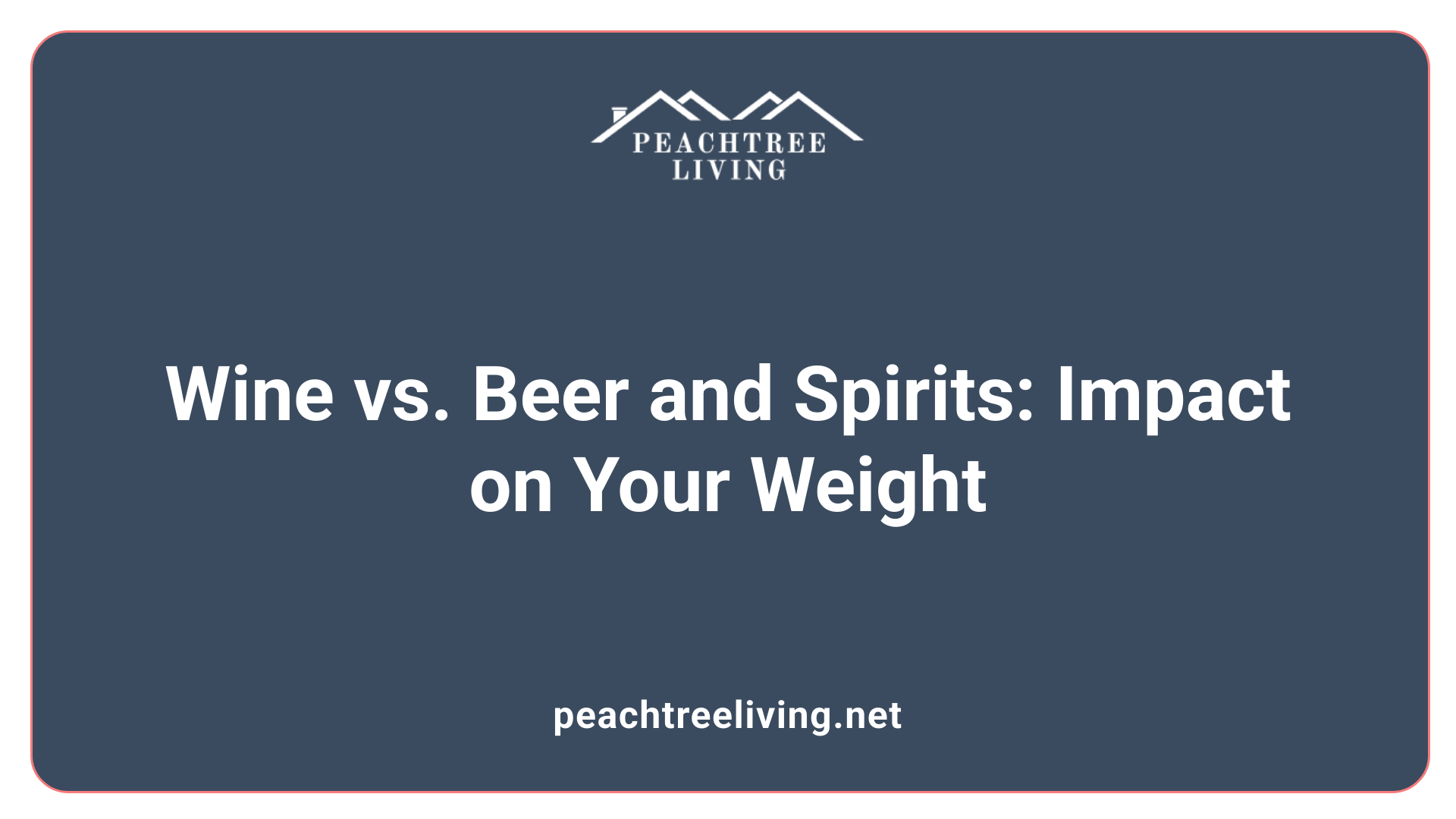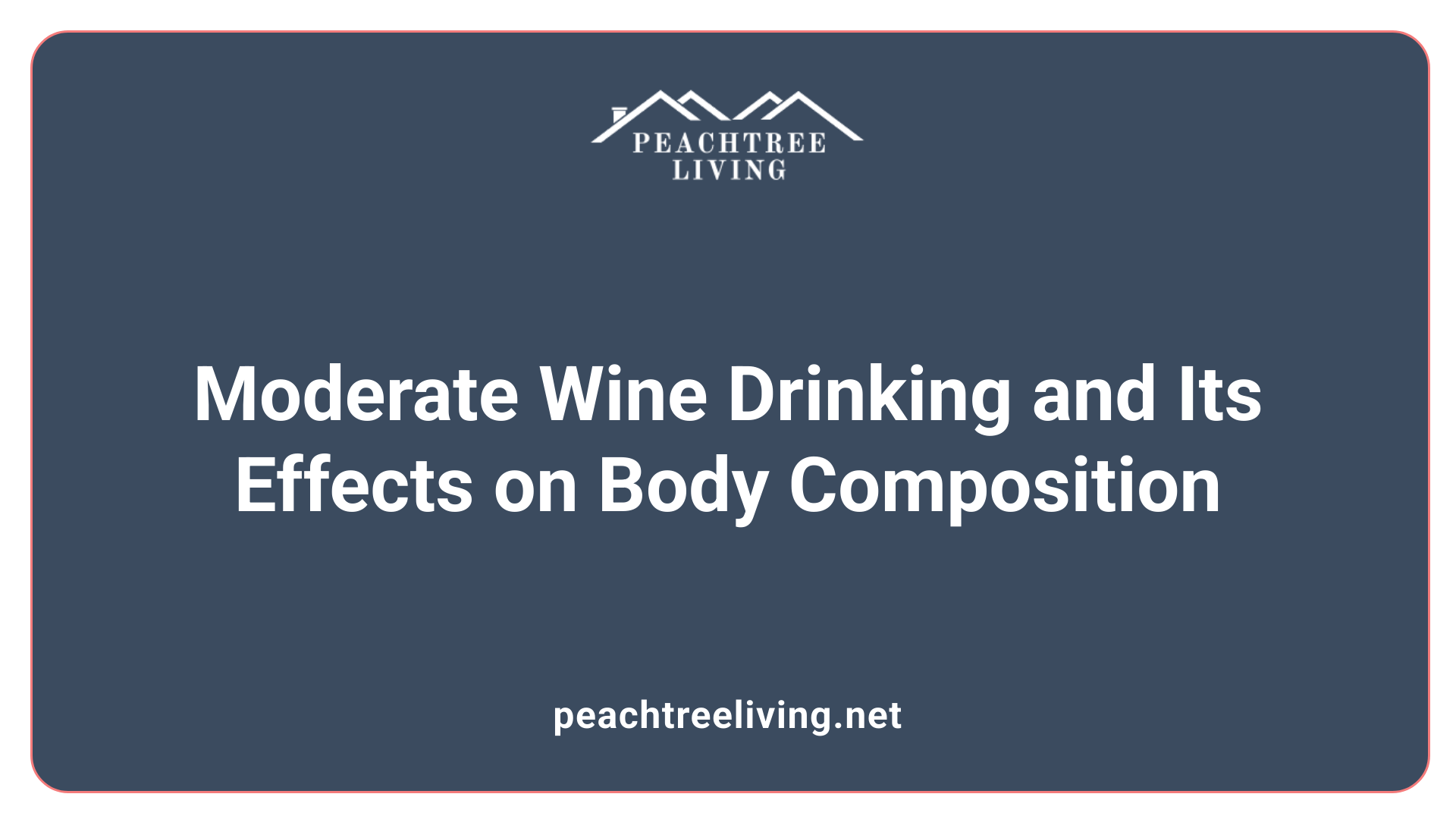Understanding Wine's Role in Weight Management
Many wine enthusiasts wonder whether that glass of wine could be impacting their weight. While wine contains antioxidants and can be part of a healthy diet, its calorie content and effects on metabolism raise concerns about weight gain. This article explores how wine consumption affects body weight, appetite, and overall health, providing a comprehensive guide to mindful drinking.
Caloric Content and Variability in Wine

What is the calorie count of a standard wine glass?
A typical 5-ounce glass of wine contains approximately 120 to 125 calories. This can vary slightly depending on the wine's alcohol content and residual sugars. For example, a standard glass of wine (about 175ml at 12%) can have up to 158 calories.
How do different types of wine compare in calories?
Different types of wine have varied calorie counts influenced largely by their sugar and alcohol levels. Dry red wines like pinot noir and cabernet sauvignon tend to be lower in sugar and calories, generally around 120 calories per 5-ounce serving. Conversely, sweet wines have higher residual sugar content, leading to increased calorie counts. Sparkling wines, especially dry varieties, generally contain fewer calories, roughly 98 to 105 calories per 5-ounce serving. Richer or dessert wines can have significantly more, sometimes exceeding 150 calories per serving.
Here’s a quick comparison:
| Wine Type | Calories per 5 oz | Notes |
|---|---|---|
| Dry Red Wine | 120-125 | Low sugar, rich in antioxidants like resveratrol |
| Sweet Wine | 150+ | High sugar content, more calories |
| Sparkling Wine | 98-105 | Fewer calories if dry, varies with sweetness |
| Dessert Wine | 150-200 | Very high sugar and calorie content |
What impact do sweet wines and sparkling wines have on calorie intake?
Sweet wines tend to have more calories because of higher sugar content, which adds to the caloric load. While they offer enhanced flavor, their higher sugar levels can contribute to calorie excess if consumed regularly. Sparkling wines, particularly the brut varieties, usually have fewer calories than still wines of similar alcohol content. Choosing dry sparkling options can help manage calorie intake. However, larger pours or sweeter options can quickly increase calorie consumption.
Understanding the caloric differences and choosing wines wisely—such as opting for dry reds or sparklers with less residual sugar—can help balance enjoyment with health considerations. Regular moderation, paired with mindful drinking habits, is essential to prevent weight gain while still benefiting from some of wine’s potential health effects.
How Alcohol, Especially Wine, Influences Calorie Intake and Metabolism

What are the effects of alcohol, especially wine, on calorie intake and metabolism?
Alcohol, including wine, contains about 7 calories per gram, which is nearly as high as fat. These are considered empty calories because they provide energy without essential nutrients. Regular consumption of alcohol can lead to an increased total calorie intake, especially when paired with high-calorie foods or large-serving drinks.
When alcohol is consumed, the body prioritizes metabolizing it over other nutrients. Specifically, the liver processes alcohol into acetate, which it uses for energy before burning fats or carbohydrates. This shift slows down fat oxidation, the process by which the body burns stored fat for energy.
As a result, alcohol can contribute to fat accumulation, particularly around the abdominal area. It also impairs nutrient absorption and recovery, affecting overall energy metabolism and potentially reducing physical endurance. Additionally, alcohol may stimulate appetite hormones, increasing feelings of hunger and cravings for salty, greasy, or calorie-dense foods.
While moderate drinking might not always cause weight gain, excessive or frequent alcohol intake—especially binge drinking—can significantly boost calorie consumption and promote fat storage. Therefore, understanding alcohol's impact on metabolism is essential for managing weight and maintaining health.
Comparing Wine to Other Alcoholic Beverages in Weight Impact

How does wine compare to other alcoholic beverages in terms of its impact on weight gain?
Wine, particularly red wine, is often viewed as a moderate option when it comes to alcohol consumption and body weight. A standard 5-ounce glass of wine provides around 120 calories, which is relatively moderate compared to other drinks. Red wine has been linked to potential protective effects against fat accumulation, partly due to its antioxidant content, such as resveratrol, and its tendency to increase HDL cholesterol. These properties might contribute to less visceral fat buildup.
In contrast, beverages like beer and spirits tend to be associated with higher calorie content and a greater propensity for promoting fat storage. For example, a pint of regular beer can contain approximately 150-200 calories, while spirits mixed with calorie-rich mixers can easily surpass these numbers. Sweet wines and high-alcohol craft beers can deliver even more calories, increasing the risk of weight gain if consumed regularly.
Overall, moderate consumption of red wine, especially when paired with healthy habits, may have a smaller negative impact on weight compared to other alcoholic drinks. However, it's important to remember that excess intake of any alcohol contributes to calorie surplus, which can lead to weight gain over time. Choosing lower-calorie options, controlling portions, and maintaining a balanced diet are essential for weight management.
Wine’s Impact on Weight and Body Composition

How does wine consumption impact weight gain and body composition?
Research on moderate wine drinking suggests that it is generally not associated with significant weight gain or negative changes in body composition. Prospective and experimental studies show that moderate intake, especially of red wine, may even offer some benefits such as reduced visceral fat and increased HDL cholesterol, which are linked to better metabolic health. Red wine contains antioxidants like resveratrol, which might contribute to its anti-inflammatory effects. Interestingly, white wine has been associated with higher bone density, though its effect on fat accumulation is less clear.
However, heavy or binge drinking is consistently connected with increased body fat, particularly around the abdomen. Alcohol-rich drinks are calorie-dense, containing around 7 calories per gram, and can stimulate appetite and cravings for salty or greasy foods. When alcohol is consumed in excess, the body prioritizes metabolizing it over other nutrients, slowing fat burning and promoting fat storage.
Alcohol’s influence extends to hormonal regulation, which can increase hunger signals and reduce satiety, encouraging overeating. It also temporarily hampers the body’s ability to oxidize fat, favoring fat accumulation over time.
Thus, the overall impact of wine on body weight and composition varies depending on the drinking pattern, quantity, and individual lifestyle factors. Maintaining moderation, limiting intake according to health guidelines, and pairing wine thoughtfully with meals are effective ways to enjoy wine without negatively affecting body composition.
Strategies for Moderate Wine Consumption and Weight Control
How can one moderate wine intake to minimize weight gain?
Managing wine consumption effectively involves several practical approaches. First, sticking to standard serving sizes is essential—about 5 ounces for women and 5-6 ounces for men. This helps monitor calorie intake since a typical glass contains approximately 120-125 calories.
Opting for dry wines with low residual sugar can significantly reduce calorie consumption because these wines contain less sugar and fewer grams per bottle. Pairing wine with meals can also promote satiety, slowing down alcohol absorption and reducing the likelihood of overeating. Sipping the wine slowly and alternating with water or non-alcoholic beverages further curtails total alcohol intake.
Avoiding high-calorie mixers, desserts, and salty snacks while drinking is another effective strategy. These additions can add extra calories and promote cravings for unhealthy foods. Setting personal drinking limits before going out, such as one glass per day for women and up to two for men, aligns with moderate drinking guidelines and helps maintain a healthy weight.
In summary, mindful choices—controlling portion sizes, choosing lower-sugar wines, pairing responsibly, and avoiding calorie-dense accompaniments—are key to enjoying wine without significantly impacting weight. The goal is to savor wine responsibly while balancing it with a healthy diet and lifestyle.
Wine, Hunger, and Nutritional Content
Does drinking wine influence hunger and appetite?
Current scientific evidence suggests that wine or alcohol consumption does not directly stimulate hunger before eating. Instead, its effects on appetite are more nuanced and depend on the context of consumption.
When alcohol is consumed after a meal, it may increase appetite and lead to greater food intake. This effect is believed to be due to alcohol’s influence on neurochemical systems involved in hunger regulation. Alcohol inhibits hormones like leptin, which signals fullness and satiety, potentially making food more appealing.
Additionally, alcohol can enhance the perception of the palatability of food, encouraging overeating. While alcohol decreases levels of ghrelin, a hormone that stimulates appetite, the overall impact on hunger is complex. It involves increased responses to food cues in the brain, which can promote further eating.
In practical terms, drinking wine before or during a meal might increase the tendency to eat more, especially if paired with high-calorie foods or snacks. Managing this effect by choosing moderate amounts, eating protein-rich foods beforehand, and staying mindful of portion sizes can help maintain a healthy balance.
In summary, alcohol’s effect on hunger appears to be context-dependent, generally promoting increased eating when alcohol is consumed alongside or after meals, rather than beforehand.
Balancing Enjoyment and Health
Enjoying a glass of wine can be part of a healthy lifestyle when consumed responsibly. While moderate consumption offers potential health benefits and less impact on weight compared to other alcohols, overindulgence increases the risk of weight gain and adverse health effects. Understanding the calorie content, moderating intake, and choosing wines wisely can help enthusiasts enjoy wine’s pleasures while maintaining their weight and health.
References
- Is Wine Fattening? - Healthline
- Alcohol and weight gain | Better Health Channel
- Does Wine Make You Fat? Some Illuminating Evidence
- Does Drinking Alcohol Make You Gain Weight? - Health
- Weight loss and alcohol Information | Mount Sinai - New York
- Wine and Your Waistline: Why You Aren't Losing Weight
- Calories in alcohol - NHS

